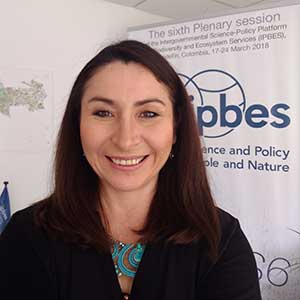From Pledges to Policy and Practice: Moving Nature to the Heart of Decision-Making
BOGOTA, Colombia, Sep 30 (IPS) - This week, Heads of State and Government from 64 countries announced one of the strongest pledges yet to reverse the loss of biodiversity and nature's contributions to people by 2030. Advancing from powerful pledges to concrete policy and action, however, means that nature must be moved to the heart of global, national and local decision-making. It's time for nature to be reintegrated into everything we do.

The Leaders' Pledge for Nature is an explicit declaration of a planetary emergency, driven by human actions that are degrading nature and our climate at rates and levels unprecedented in human history.
As a firm re-commitment to urgent action ahead of the United Nations Summit on Biodiversity, taking place today in New York and virtually around the world, it can be a vital and positive turning point towards the transformative change needed for people and nature – but this will require a fundamental, system-wide reorganization across technological, economic and social factors, including paradigms, goals and values.
Biodiversity is the foundation of human life and well-being. When we destroy the natural world, we endanger our own lives and livelihoods. Effective action on nature must, therefore, be based on the best-available science and expertise – to properly understand our challenges and the options available for a better future.
The undertaking in the Leaders' Pledge – that the design and implementation of policy will be science-based – is therefore extremely welcome. The science, evidence and expertise already exist in the IPBES Global Assessment Report on Biodiversity and Ecosystem Services and other key IPBES reports.
It is evident, from the science, that we are living in an unsustainable downward spiral of land- and sea-use change, over-exploitation, pollution, climate change and invasive species – and that we are the cause. This drives the devastation of nature and directly impacts our own quality of life through food, health, the economy and even peace and security.
Placing nature at the center of decisions in key sectors – including agriculture, fisheries and forestry, energy, tourism, health, infrastructure, extractive industries, and trade – will help to end this vicious cycle. Nature makes invaluable material and non-material contributions to our lives across every sector of human development and activity. The whole of Government approach described in the Pledge is, therefore, grounded in solid science, and is absolutely necessary.
Sustainable use, wise management and effective conservation of natural resources – strengthened by the full and effective participation of indigenous peoples and local communities, are key components of a more effective and integrated approach.
The fact that the first-ever UN Summit on Biodiversity is taking place amidst the COVID-19 pandemic – is framing the urgency of our frayed relationship with nature in terms that make biodiversity loss extremely personal and undeniably significant. Humanity now stands at a crossroads for meaningful change. If we fail to take this opportunity to voluntarily change course, we risk entering uncharted waters where pandemics, for instance, are more likely and more devastating.
As the UN Secretary-General said during the UNGA75 High-Level Week, "solidarity is self-interest." Our shared challenge – as leaders and citizens – is to rally around nature as our common ground and our common home – to recognize that nature itself contains most of the solutions to address our shared threats of biodiversity loss and climate change.
Perhaps the most encouraging element of the Leaders' Pledge for Nature is the explicit commitment to meaningful action and mutual accountability, beyond words on paper. If we are to achieve the Sustainable Development Goals and to build a sustainable future, we must leave behind the outdated ‘business-as-usual' models, informed by the current, limited paradigm of economic grow at all costs.
We begin by rediscovering that nature is inextricably linked to every decision we make – in economic, social, political and technological spaces – and seizing this unprecedented opportunity to shift our world towards a more sustainable future, with nature at the heart of our approach.
As hundreds of the world's leading scientists found, and intergovernmental representatives from more than 130 Member States agreed last May: "By its very nature, transformative change can expect opposition from those with interests vested in the status quo, but such opposition can be overcome for the broader public good."
The author is Chair of IPBES
About IPBES:
IPBES is an independent intergovernmental body comprising 137 member Governments. Established by Governments in 2012, it provides policymakers with objective scientific assessments about the state of knowledge regarding the planet's biodiversity, ecosystems and the contributions they make to people, as well as the tools and methods to protect and sustainably use these vital natural assets. To some extent IPBES does for biodiversity what the IPCC does for climate change. For more information about IPBES and its assessments visit www.ipbes.net
© Inter Press Service (2020) — All Rights Reserved. Original source: Inter Press Service
 Global Issues
Global Issues